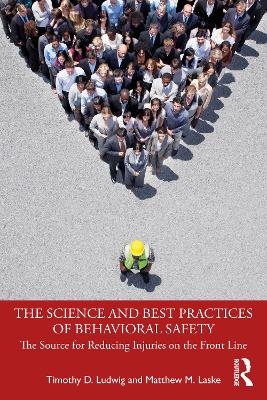
The Science and Best Practices of Behavioral Safety
Routledge (Verlag)
978-1-032-25600-9 (ISBN)
This book presents the scientific principles and real-world best practices of behavioral safety, one of the most mature and impactful applications of behavioral science to reduce injuries in industrial workplaces.
The authors review the core principles of behavioral science and their application to modern safety processes. Process components are discussed in detail, including risk analysis and pinpointing, direct observation, performance feedback, reinforcing engagement, trending and functional analysis, behavior change interventions, and program evaluation. Discussions are complemented by industry best-practice case studies from world-class behavioral safety programs accredited by the Cambridge Center for Behavioral Studies (CCBS), which provide compelling evidence of the effectiveness of these behavioral science principles in reducing injury.
The Science and Best Practices of Behavioral Safety is essential reading for safety professionals, process safety engineers, and leaders in companies who have implemented, or are considering implementing, behavioral safety; or as an aid to learning more about the scientific background behind effective and practical safety practices. Researchers, expert consultants, and students who are already familiar with the practice will also find the book a valuable source to further develop their expertise.
Timothy D. Ludwig, Ph.D., has more than 30 years of experience in research and practice in behavioral safety. Dr. Ludwig is a Distinguished Graduate Professor at Appalachian State University; serves on the Cambridge Center for Behavioral Studies (CCBS) Commission for the Accreditation of Behavioral Safety; and disseminates his writings on Safety-Doc.com. Matthew M. Laske, M.A. received his master's in industrial-organizational psychology from Appalachian State University and is completing his doctoral degree at the University of Kansas. Matthew has designed, implemented, and assessed behavioral safety programs in multiple industries and is recognized by the CCBS as a Distinguished Scholar.
1. Why Behavioral Safety?
2. Risk Analysis and Pinpointing
3. Direct Observation
4. Performance Feedback
5. Reinforcing Engagement
6. Trending and Functional Analyses
7. Behavior Change Interventions
8. Evaluation
9. Conclusion
| Erscheinungsdatum | 27.03.2023 |
|---|---|
| Zusatzinfo | 5 Tables, black and white; 41 Line drawings, black and white; 3 Halftones, black and white; 44 Illustrations, black and white |
| Verlagsort | London |
| Sprache | englisch |
| Maße | 152 x 229 mm |
| Gewicht | 280 g |
| Themenwelt | Geisteswissenschaften ► Psychologie ► Allgemeine Psychologie |
| Geisteswissenschaften ► Psychologie ► Arbeits- und Organisationspsychologie | |
| Technik ► Umwelttechnik / Biotechnologie | |
| Wirtschaft ► Volkswirtschaftslehre | |
| ISBN-10 | 1-032-25600-1 / 1032256001 |
| ISBN-13 | 978-1-032-25600-9 / 9781032256009 |
| Zustand | Neuware |
| Informationen gemäß Produktsicherheitsverordnung (GPSR) | |
| Haben Sie eine Frage zum Produkt? |
aus dem Bereich


